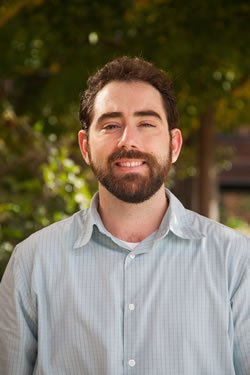New faculty spotlight - David Gire
 |
| Photo: David Gire |
What do art, philosophy, and neuroscience have in common? Plenty, according to new Assistant Professor David Gire, who has interests in all three.
David’s interdisciplinary interests began in high school in San Jose, CA, where he was raised and his two brothers and parents still live. Inspired by a nationally renowned teacher about the value of studying the intersections of different disciplines (in high school, it was genetics and the law), David went on to UC Berkeley to double major in Philosophy and Neurobiology. He continued on with a Ph.D. in neuroscience from the University of Colorado at Denver, where he stayed on for a two-year post-doctoral position. He finished a second post-doc at Harvard before joining our department this January.
How does philosophy tie in with his science? Logical rigor and clean writing, attests David. Most importantly, it was philosophy that piqued his interests in the big, basic questions: Where does our sense of self come from? What is consciousness? David delved into such fundamental questions through research with humans at first, studying psychophysics with Mathew Diamond’s lab in Trieste, Italy. Others in the lab worked on information processing by neural circuits in rodents. The ability of this work to more directly connect what neurons in the brain were doing with perception and behavior inspired David to attempt to understand the brain at this more reductionist level.
And art? An early fascination and admiration for neuroanatomy led to interest in classical representations of the human form, which led him to seek out Caravaggio paintings in Rome when on fellowship in Italy. In his scientific reports, he incorporates his art, using computer software to create three-dimensional images from his findings. One was chosen for the cover of the journal Neuron in 2011.
In his research, David seeks to combine multiple disciplines to understand how neural circuits in the brain process complex natural stimuli to guide flexible behaviors such as navigation and foraging. David’s research employs the rodent olfactory system as a model for sensory information processing. This sensory system is well suited for studying how neurons process complex stimuli since odors are transported through the environment by chaotic, turbulent plumes. By studying how the brain uses these fluctuating odor cues to perform ethologically important behaviors, David seeks to define fundamental operations performed by the brain to interpret input from a chaotic, noisy environment.
The key attraction of UW, David explains, was the potential for fruitful collaborations. His interests in complex behaviors such as navigation were a natural fit with ongoing work in the Department of Psychology’s Behavioral Neuroscience area and his desire to employ ethologically-relevant paradigms was supported by research in the Animal Behavior area. Across the campus, the strength of UW in neuroscience also drew David to Seattle. In fact, he had his eye on UW after a series of invited lectures at Harvard from a variety of UW professors, including Jeff Riffell and Nathan Kutz. Their work demonstrated the interdisciplinary and collaborative nature of the science in Seattle.
David is an eager instructor, having volunteered to teach without compensation while he was in graduate school. Here at UW, he has already accepted two graduate students and looks forward to teaching a graduate course on computer programming for data analysis in the Spring.
David has enticed a fellow neuroscientist from Denver, Mike Grybko, to come to UW as the manager of David’s new lab. Another man of many talents, Mike is a skilled classical guitarist. David’s wife, Arisa, is a graduate from the same doctoral program in Denver as he attended. An Eagle Scout, he is excited about exploring with her the many outdoor attractions in the Northwest. This spring, they find themselves a little busy with other activities: they welcomed their first child in late April.